04 Jan 2019
UK museums asking staff to carry out provenance research on colonial items
BY Luke Cloherty

A number of major British museums are taking steps to learn the origins of artefacts on display originally procured in the colonial era.
London’s British Museum and the V&A, as well as Oxford’s Pitt Rivers Museum, are all tasking current research staff with providing visitors with greater clarity on the origin of such items and are making the process of disseminating their provenance research back to visitors clearer.
Curators at the British Museum, for example, are incorporating new provenance research into audio guides, as well as striving for "very honest" labels.
Meanwhile, Pitt Rivers is recruiting a research assistant to manage a labelling project. The successful candidate for that role will "tackle a complex problem around historical labelling and language-use in the much-loved and criticised Pitt Rivers Museum", with the aim to "dissect and dismantle some of the complex contested words, stereotypes and concepts that are present not only in museums but in society at large".
A V&A spokesperson said that the museum has "strengthened its commitment to provenance research" and recently appointed a dedicated provenance and spoliation research curator.
The V&A’s events programme in 2018 also held conferences on the history of Britain’s colonial past called Troubling Objects and Practices of Engagement with Contested Heritage Collections, reflecting its wish to openly debate the topic over which it, and many other museums around the country, have been heavily criticised for.
Tristram Hunt, director of the V&A, said: "Through exhibitions, conservation work, provenance research, talks and events, the V&A is committed to exploring our own colonial history with rigour and transparency - and to building platforms for partnership and collaboration around the world."
Close Window